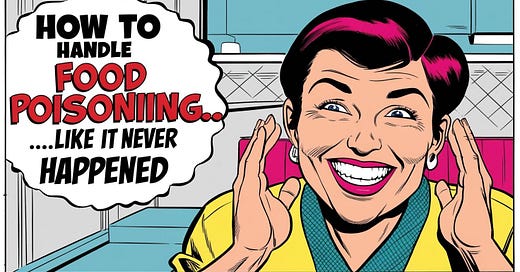Welcome to the final part of the series on food poisoning.
In the last letter, we explored the common signs and symptoms of food poisoning and the two golden keys you need to protect yourself. We can only hope you haven't lost them - the keys. 🌝
Find them here in case you have.
Now, what should you do if you or someone close to you experiences food poisoning?
1. Hydrate
Diarrhea and vomiting are major symptoms of food poisoning. When this happens, your body loses a lot of fluids and electrolytes; tiny minerals like sodium and potassium that help your body function properly.
To help your body recover:
Use Oral Rehydration Solution/Salt (ORS). ORS can be made at home or bought over the counter. Subscribe so you don’t miss the next letter where you'll learn how to make ORS at home.
After each episode of diarrhea or vomiting, drink 200–400 ml of ORS solution. For reference, a 50 cl bottle of water equals 500 ml, so 200–400 ml is less than a full bottle.
If ORS isn’t accessible, drink plenty of water ( up to 2 to 3 glasses at once, at intervals) especially in mild cases of diarrhea.
2. Over-the-Counter (OTC) Medications
For relief from diarrhea, Loperamide is a safe and effective OTC option. However, it is important to always check with a doctor before using any medication, especially for children and pregnant women.
Vomiting and diarrhea are your body’s way of flushing out toxins, so using medications without medical advice can suppress these symptoms, making it harder to assess the severity of the illness.
3. Get Plenty of Rest and Control Fever
Conserve your energy by taking adequate bed rest. Control high temperatures by mopping your body with a clean napkin soaked in tepid water, focusing on the forehead, the nape of the neck, armpits, and groin.
4. Watch Your Diet
When food poisoning kicks in, your digestive system is in distress. It is important to watch what you eat to avoid worsening your symptoms.
Solid foods give your digestive system more work to do so start with simpler meals. Avoid caffeine, foods high in fat e.g., pastries and other fried foods, dairy, etc., until symptoms subside.
Preventing the Spread
Did you know food poisoning is contagious? The microorganisms that cause it can spread easily if proper hygiene is not followed. To prevent the spread of these microorganisms to others;
1. Avoid preparing food for others until symptoms subside.
2. If you must cook, wash your hands thoroughly with soap and water.
3. Practice good toilet hygiene; disinfect the floors, seat, sinks, and door knobs regularly.
When to See a Doctor
Don’t hesitate to seek medical attention if you experience:
1. Bloody diarrhea (blood in your stool)
2. High fever (above 101.5°F or 38.6°C)
3. Persistent vomiting lasting more than 24 hours
4. Severe dehydration (very dry mouth, little or no urination, dizziness, or dark-colored urine)
5. Neurological symptoms (blurry vision, muscle weakness, or tingling sensations)
Next Up:
- How to make Oral Rehydration Solutions (ORS) at Home
- Female Reproductive Health Series
Stay tuned and subscribe so you don't miss subsequent posts.
What's one thing you have learnt from this series?










Thank you, RN!
I love the pictures!
Let’s make ORS!!!
This is really beautiful. I look forward to learning how to make ORS.